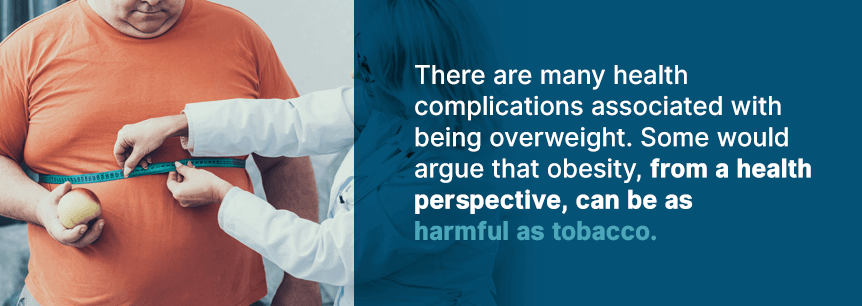
Medical cannabis can be especially helpful for the goal of weight loss. You may already know that one of the main characteristics of cannabis is it can increase your desire to eat. However, what you probably don’t realize is there are also strains that can help you lose weight. Sure, marijuana often associates with “the munchies,” which could indeed lead to weight gain. But some studies indicate medical marijuana and weight loss is possible. Let’s learn more about this.

First, let’s take a look at how marijuana affects the body. Your endocannabinoid system (ECS) plays an essential role in your body beyond interacting with cannabis.
Endocannabinoids are cannabis-like substances produced inside our bodies naturally.
The endocannabinoid system consists of three parts:
Your ECS isn’t just a natural part of your body — it’s a vital one. Marijuana and its two main cannabinoids, cannabidiol (CBD) and tetrahydrocannabinol (THC) have medicinal properties. Medical research suggests the scope and size of the endocannabinoid system has a lot to do with the far-reaching effects of the herb and these two cannabinoids.
Find A Doctor Find A Dispensary
Your body is continuously working to monitor essential functions and levels in your body. When something operates outside of the proper range, the body immediately activates the ECS to correct it. For example, when you become hot and begin sweating, it’s your ECS that works to cool you down. If your stomach starts to growl, that’s just your ECS reminding you to eat.
Your endocannabinoid system does this through cannabinoid receptors found in certain tissues. You have, at a minimum, two cannabinoid receptor types:
It’s thought cannabinoid receptors are most plentiful in the central nervous system, and some researchers theorize we may even have a third as-yet-undiscovered receptor as well.
The ECS uses these receptors to regulate essential functions including the appetite and digestion.
“Marijuana diet” might sound contradictory given the herb is known for its notorious “munchies” side effect, which often causes many regular users to consume more calories than those who don’t use the herb. However, studies recently have indicated otherwise.
The American Journal of Medicine conducted one such study, surveying 4,657 adults. Out of these adults, 579 claimed to be regular marijuana users. The study found individuals who used marijuana a minimum of three to five times weekly had 16 percent lower fasting insulin levels. Other studies have had similar results.
Some theorize medical weed regulates weight because it interferes with the brain’s cannabinoid receptors that regulate memory and appetite. When CBD triggers these receptors, it leads to a lapse in memory and the well-known insatiable appetite. However, over time, these receptors may start becoming desensitized, making regular marijuana users less likely to experience weight gain.
Others suggest obese individuals overeat because the process triggers the brain’s reward center, particularly when the chosen foods contain hefty amounts of refined starches and concentrated sugars. So, in a sense, the act of overeating acts like a drug, because it stimulates the same brain area — regular users of cannabis don’t need to overindulge like this because they have their own “high.”
The American Journal of Epidemiology published a report in 2011 that showed rates of obesity are around a third lower in people who smoked medical pot regularly than in those who didn’t smoke the herb at all. Additionally, cannabis also helps with stress, and stress is a common cause of obesity.
No matter how much smoking of medical marijuana for weight loss you do, and no matter what strains you use, consuming a large number of calories every day without burning them off will lead to weight gain.
Some cannabis strains have been shown to help control appetite due to the cannabinoid tetrahydrocannabivarin (THCV). THCV is a CB1 and CB2 receptor antagonist, meaning it blocks THC and prevents you from becoming high and getting the munchies. While it is still psychoactive like THC, it seems to take effect quicker, and the high you get is much shorter lived.
Some appetite-suppressing strains with THCV you could try are:
Although Super Silver Haze is categorized as a sativa, its parent strain, Northern Lights, does have indica qualities such as sleepiness hitting several hours after smoking. So, if you plan on using Super Silver Haze, be sure you stay active after using the strain to help keep your motivation.
Sativa cannabis strains, in general, are known for bringing more energy and focus. They don’t make you sleepy or keep you stoned for hours. Instead, they do the opposite, making them ideal marijuana and weight loss strains.
Try a sativa strain before a workout to help boost your energy levels and achieve your fitness goals more quickly.

Cannabis can potentially produce certain physical and psychological side effects. Not everyone will experience the same side effects and what you experience will depend on the strain of marijuana you use and the method in which you use it.
It’s good to know the potential side effects in any event. Remember the side effects of the herb are typically much milder than those you’d experience with prescription medicines.
Some side effects of marijuana for weight loss you could experience are:

The ideal cannabis consumption method is your own choice. You have many delivery options to pick from, and each will have its impact on how cannabis affects you. Here are several ways to receive your treatment:
Obesity is a growing concern throughout the U.S. as nearly 35 percent of all American adults are obese. The Centers for Disease Control and Prevention (CDC) credits obesity as responsible for roughly 112,000 deaths in the U.S. each year. Obesity among children is another growing concern in the U.S. with an obesity rate of 18.5 percent among children between the ages of 2 and 19.
Weight loss is a process by which people lose weight. People choose to lose weight for a variety of reasons, the most common of which are related to improving health and appearance. Healthy weight loss often is based on goals of reaching a body max index (BMI) of between 18.5 and 24.9, according to the National Institutes of Health (NIH).
Most people who are overweight have reached this point through a combination of dietary choices and sedentary lifestyles. We are no longer a hunter-gatherer people that burns as many calories getting our food as we consume while eating it.

The wide availability of high-calorie and heavily-processed foods that pack on the pounds, coupled with jobs that are decreasingly physical, contributes widely to the growing obesity problem. Other factors may play a role in obesity, such as:
Because many factors can contribute, it never hurts to work in conjunction with a trusted physician to create an effective weight loss plan and to determine if there may be underlying causes of your current weight and health circumstances.
Medically, obesity is a state in which your BMI exceeds certain standards. A normal BMI is no greater than 24.9 while a BMI of 25 to 29.9 indicates you are overweight. Beyond that, there are three classes of obesity based on BMI:
Because obesity is a condition that can affect your physical and emotional health, depression, social isolation, underachieving in the workplace and lack of confidence are all other symptoms that people who are overweight may experience.
There are many health complications associated with being overweight. Some would argue that obesity, from a health perspective, can be as harmful as tobacco.

Obesity is a condition that affects people on many fronts — not just what shows up on the scales. Because of this, it’s important to consider the physical, mental and emotional aspects of the condition as well.
Americans widely use three primary methods of losing weight.
This is an old-fashioned method of weight loss that involves cutting calories by making healthier food choices while simultaneously burning more calories through exercise.
Depending on your adherence to a healthy diet and exercise plan, it’s possible to lose approximately one to two pounds per week until you achieve your weight loss goals. This method can produce a slow, steady and sustainable weight loss if you’re willing to make major lifestyle changes.
This style of weight loss often involves very strict dietary restrictions along with prescribed medications to assist in the weight loss process. Work with your primary physician or a trusted medical professional to discuss options available to you before resorting to facilities promising extreme weight loss results.
A variety of weight loss surgeries are available today to help you lose weight by reducing the size of your stomach. Bariatric surgery can restrict the amount of food the stomach can hold or bypass the small intestine, effectively reducing the number of calories the body absorbs. The weight loss surgeries most commonly used today include:
Surgery is the riskiest of the primary weight loss methods you can use today but helps to fuel your weight loss efforts and drive by jump-starting your weight loss efforts. It helps to sustain motivation to see pounds melt off quickly though it is up to you to sustain the weight loss and maintain the results.
So, does marijuana make you lose weight? When used properly and combined with a healthy diet and exercise, it could. Before you begin your medical marijuana and weight loss treatment, however, you’ll want to be sure you know your state laws surrounding it.
Once you do this and it’s approved in your state to help with your weight loss, you’ll next want to find a good cannabis doctor and dispensary. Look no further than MarijuanaDoctors.com. We can provide you with both as well as ensure you get on the right path with your medical cannabis treatment. Start using cannabis for your weight loss goals today.
Find A Doctor Find A Dispensary


Please allow us to access your location to find local dispensaries.
VIEW ALL DISPENSARIES ➔